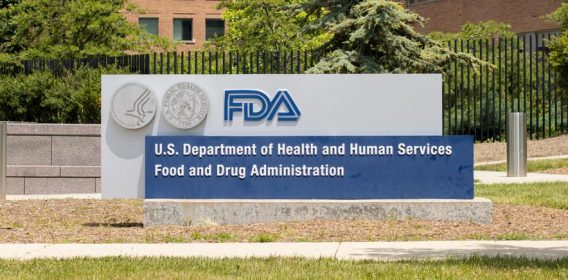FDA Report Cites Sterility Concerns at Global Pharma Eye Drop Facility
Editors carefully fact-check all Consumer Notice, LLC content for accuracy and quality.
Consumer Notice, LLC has a stringent fact-checking process. It starts with our strict sourcing guidelines.
We only gather information from credible sources. This includes peer-reviewed medical journals, reputable media outlets, government reports, court records and interviews with qualified experts.

U.S. health officials criticized India-based Global Pharma’s manufacturing processes after eye drops produced there were linked to the serious injuries, death and blindness of Americans who used the products.
A heavily redacted report published by the U.S. Food and Drug Administration documented an inspection visit to the manufacturing site between Feb. 20 and March 2. The inspection occurred about two weeks after the company recalled its EzriCare Artificial Tears and Delsam Pharma’s Eye Ointment over sterility concerns.
The FDA’s 14-page report notes “inspectional observations” and isn’t a final agency determination about compliance. FDA inspectors noted the following:
- Aseptic rooms were not cleaned or disinfected properly to maintain aseptic conditions.
- Inappropriate equipment was used in the manufacturing process.
- There was a failure to verify drug components before manufacturing occurred.
- There were no written procedures on how to clean, sterilize and maintain equipment.
- Packaging materials, such as bottles and caps, were not tested for sterility.
- Procedures to prevent microbial contamination of sterile products were not validated.
Officials noted an ointment made in the facility lacked preservatives to prevent microbial contamination. They also found “protruding nails and nail holes” in a room where sterile products were packaged and later shipped to the U.S.
As of late March, there were 68 reported infections in 16 states linked to the over-the-counter eye drops, according to the U.S. Centers for Disease Control and Prevention. Three people have died, eight others sustained vision loss and four people lost an eye in addition to other side effects after being infected.
The injuries are linked to Pseudomonas aeruginosa, a strain of drug-resistant bacteria found in patients’ open, multiuse bottles of EzriCare Artificial Tears, the CDC reported.
U.S. Health Inspection Exposes Sterility Concerns
Last month’s FDA inspection of the Global Pharma facility is part of an ongoing compliance matter.
“The FDA’s highest priority is protecting public health – this includes working with manufacturers to quickly remove unsafe drugs from shelves when they are identified,” the agency wrote in an email to CNN.
“The FDA continues to monitor this issue and is working with the Centers for Disease Control and Prevention and the companies recalling these affected products,” CDC officials wrote in that email. “We urge consumers to stop using these products which may be harmful to their health.”
During the FDA’s 11-day inspection of the Global Pharma facility, officials uncovered nearly a dozen observations, including a “manufacturing process that lacked assurance of product sterility.” Inspectors also found several sterility concerns for products that were manufactured between December 2020 and April 2022 and shipped to the U.S.
The agency observed the company washed and reused cleanroom garbs an untold number of times in its cleanrooms and observed “discolored, worn-out booties” being used in the intended sterile environment.
A cleanroom is a controlled environment that filters pollutants such as dust, airborne microbes and aerosol particles to provide the cleanest area possible for a sterile environment.
Global Pharma has not publicly released any information about the outbreak since it voluntarily recalled the products in February. However, the eye drop distributor, Aru Pharma, earlier sent a statement to Consumernotice.org explaining it “has taken all available steps to protect the end users of these products despite having no role in their formulation or sale to consumers.”
Consumers Urged to Discontinue Using EzriCare Products
Consumers have been filing EzriCare Artificial Tears lawsuits against Global Pharma Healthcare, Aru Pharma, EzriCare and others after using the eye drops and developing Pseudomonas aeruginosa infections. Some plaintiffs underwent months of antibiotic treatment, had surgery, or had the infection spread across their body.
The rare drug-resistant bacteria, which was previously never reported in the U.S., can spread to people who don’t have symptoms and who haven’t used the eye drops, according to the CDC.
“The bacteria can spread when one patient carrying the bacteria exposes another patient, or when patients touch common items or when health care workers transmit the germs which is why infection control, like hand hygiene, is so important,” the agency told CNN this week.
That type of spreading is common in health care settings. Many asymptomatic cases were discovered during screenings at in-patient health care facilities that had clusters of infections.
Related infections have been identified at acute care hospitals, long-term care facilities, emergency departments, urgent care clinics and other outpatient facilities, according to CNN.
Consumers who have an adverse reaction or experience quality issues with the use of any of the recalled products may report it to the U.S. Food and Drug Administration’s MedWatch adverse event reporting program. Consumers can submit reports online, via regular mail or via fax.
If consumers prefer to report via mail, download the form or call 1- 800-332-1088 to request a reporting form. Complete and return to the address on the pre-addressed form or submit via fax to 1-800-FDA-0178.